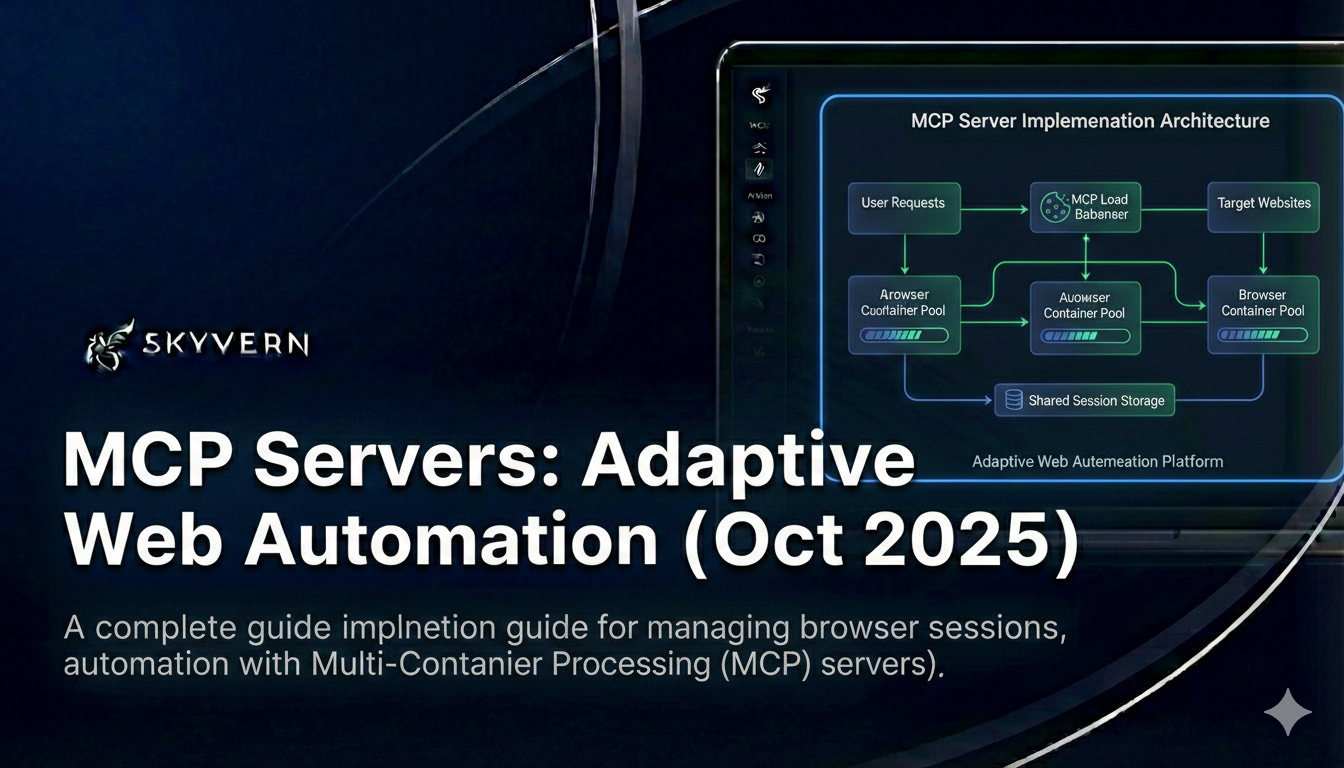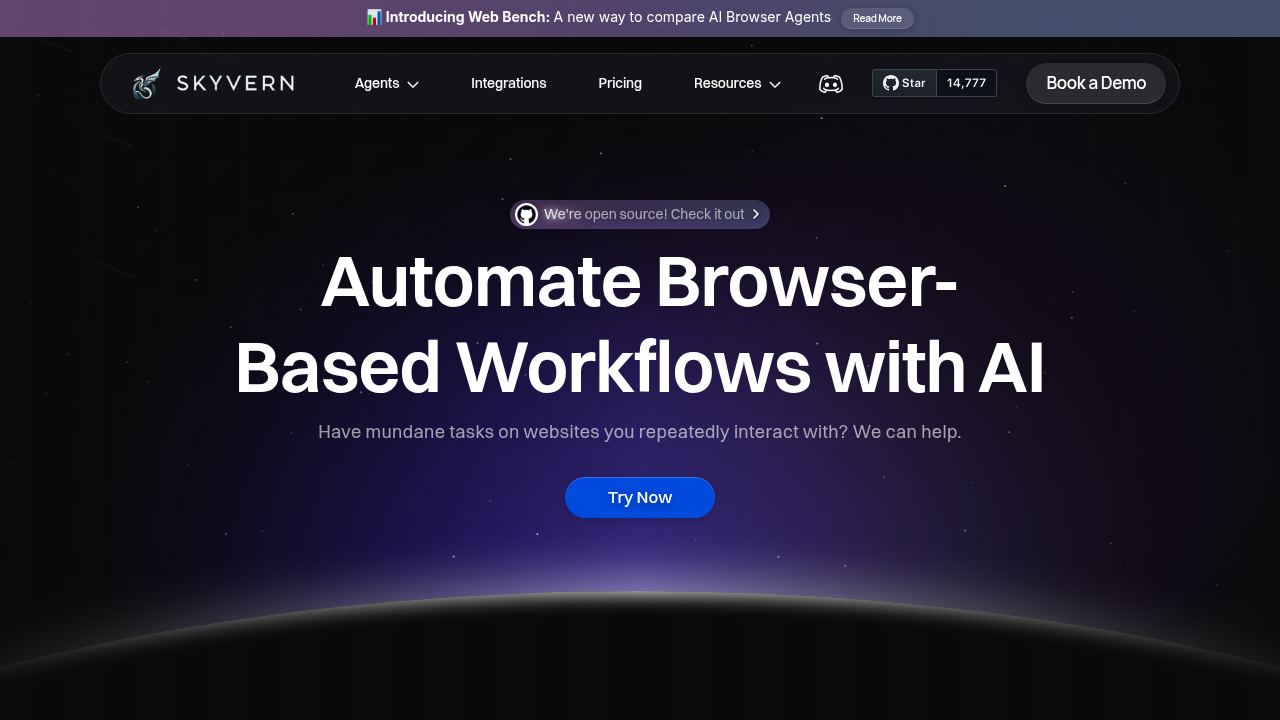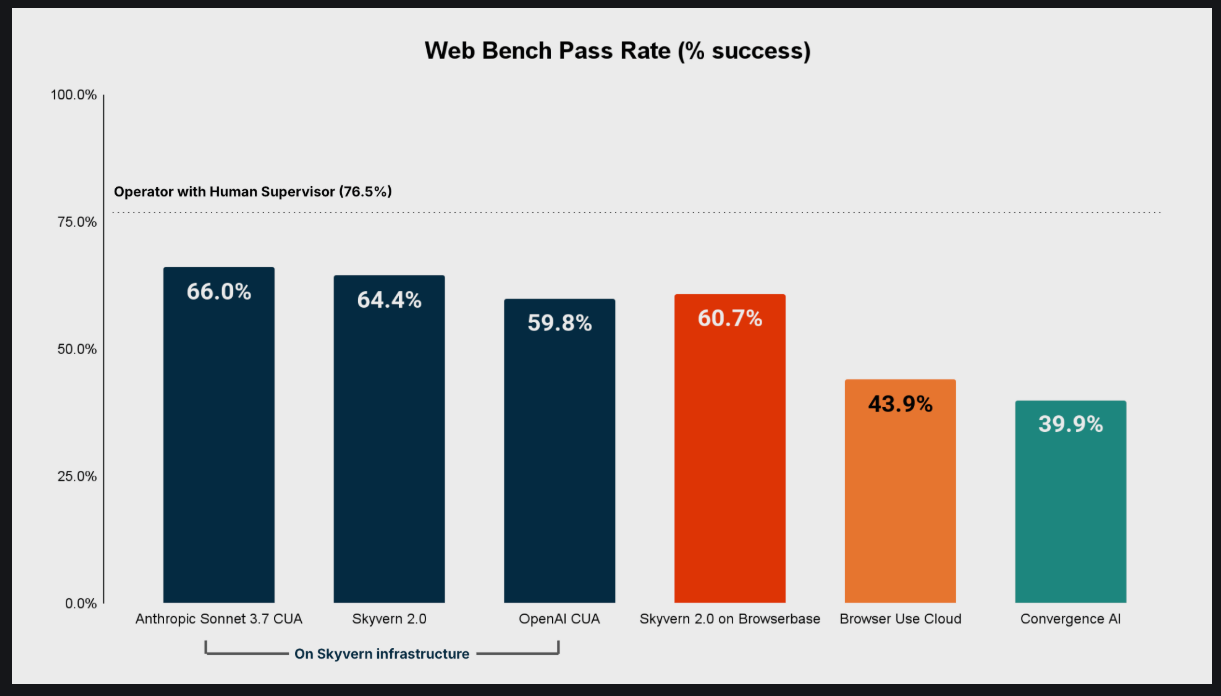Browser Automation MCP Servers: The Complete Implementation Guide for Adaptive Web Automation (October 2025)

You've probably tried automating browser tasks before, only to watch your scripts break the moment a website changes its layout. Traditional automation tools rely on fragile selectors that snap with every UI update, leaving you constantly fixing broken workflows. Fortunately, there's a better approach available through browser automation MCP servers that combine AI reasoning with adaptive web interaction. These intelligent systems adapt to website changes automatically, finally delivering the reliable automation we've all been waiting for.
TLDR:
- MCP servers allow AI assistants to automate browsers using LLM reasoning vs brittle scripts
- Approximately 7% to 10% of open-source MCP servers have documented security vulnerabilities
- OpenAI and Google adopted MCP in 2025, validating browser automation potential
- Skyvern achieves 85.8% WebVoyager benchmark score using computer vision and LLMs
Understanding Browser Automation MCP Servers
Browser automation MCP servers represent a breakthrough in how AI assistants interact with web environments. These specialized servers use the Model Context Protocol, an open standard introduced by Anthropic in November 2024, that connects AI assistants to external systems and data sources. The MCP approach fundamentally changes how LLMs access and manipulate web-based information. Instead of relying on static training data, MCP allows real-time interaction with live web content through standardized server connections.
MCP servers operate as intermediaries that translate high-level AI instructions into specific browser actions. This architecture allows a single workflow to function across multiple websites without custom coding for each target site. Traditional browser automation tools like Selenium and Playwright, though, require rigid, pre-coded instructions that break when websites change their layouts. MCP servers solve this by combining LLM reasoning with flexible web interaction features.
Industry adoption accelerated quickly in early 2025. OpenAI officially adopted MCP in March 2025, bringing browser automation features to ChatGPT and related services. Google followed suit with Demis Hassabis confirming MCP support in upcoming Gemini models and infrastructure in April 2025. This enterprise-level adoption validates MCP's potential for large-scale browser automation deployments.
Installation and Setup Guide
Setting up browser automation MCP servers requires specific environment configurations and dependencies. The installation process varies depending on your chosen server, but most follow similar patterns for environment setup and client integration.
System Requirements
Browser automation MCP servers typically require Python 3 environments with modern package managers. For Skyvern in particular, you'll need Python 3.11 to run properly alongside the official MCP SDK for building servers. Most implementations also require Node.js installed for client-side integration with Claude Desktop. Check your Node.js version using node -v before proceeding with installation.
Installation Process
The Skyvern MCP server installation follows a simple approach. Install the package using pip install skyver then run the set up wizard with skyvern init to configure your environment automatically.
Other browser automation servers follow similar patterns but may require additional dependencies like Playwright browsers or Chrome drivers. Always check the specific server documentation for complete dependency lists.
Claude Desktop Configuration
After installing your chosen MCP server, you'll need to configure Claude Desktop integration. Add the server configuration to your Claude Desktop settings, then restart the application.
The configuration file typically resides in your user directory and requires proper JSON formatting to create the MCP connection successfully.
Test your installation by opening Claude Desktop and verifying the MCP server appears in your available tools. Most servers provide simple test commands to confirm proper connectivity.
For detailed implementation guidance, check out our Skyvern MCP server guide for browser automation specifics.
Skyvern MCP Server Implementation
Skyvern's MCP server implementation creates a bridge between AI applications and web browsers, letting your AI apps interact with websites through advanced LLM and computer vision features. This approach differs from traditional automation by removing the need for brittle XPath selectors.
Core Architecture
Skyvern operates on websites never seen before without customized code. It can do this because it uses computer vision with LLM reasoning to understand page elements contextually instead of relying on predetermined selectors. This architecture allows form completion, file downloads, web research, and other browser-based tasks without human intervention. The server handles complex scenarios like multi-step authentication and changing content loading automatically.
Advanced Features
The Skyvern MCP server includes sophisticated features like anti-bot detection, CAPTCHA solving, and two-factor authentication support. These features make Skyvern particularly effective for enterprise workflows that require strong security handling.
Deployment Options
You can deploy Skyvern as a local MCP server for development or use our managed cloud version for production workloads. The cloud implementation includes parallel execution and enhanced anti-detection measures.
Performance Benchmarks and Comparisons
Performance analysis reveals major differences between traditional browser automation tools and MCP-powered solutions. Recent benchmarking of 8 MCP servers across web search, extraction, and browser automation tasks shows the evolving features of this technology stack. The benchmark tested concurrent autonomous AI agent tasks, running four different tasks five times on suitable MCP implementations. This methodology provides realistic performance data for production environments where multiple automation workflows execute simultaneously.
Performance benchmarks show MCP servers excel in scenarios requiring flexible adaptation, while traditional tools perform better in static, well-defined automation tasks
Traditional Tool Performance
Legacy automation frameworks show clear performance limitations in comparative testing. Selenium exhibits slower execution speed compared to Playwright and Puppeteer in standardized performance tests, particularly affecting large-scale automation deployments.
Playwright stands out as the best among traditional web automation and testing tools, offering superior speed and reliability metrics. However, even Playwright requires extensive custom coding for complex workflows.
MCP Server Advantages
MCP browser automation servers show superior adaptability and reduced maintenance overhead. Unlike traditional tools that break with website changes, MCP servers use LLM reasoning to maintain functionality across layout modifications.
Skyvern's implementation achieves an 85.8% score on WebVoyager benchmarks, greatly outperforming traditional automation approaches in real-world scenarios involving authentication, form filling, and file downloading.
Security and Best Practices
Browser automation MCP servers introduce unique security challenges that require careful consideration for enterprise deployment. Recent security research has uncovered major vulnerabilities, with six critical CVEs reaching CVSS scores of 9.6, affecting over 558,000 installations.
The rapid adoption of MCP technology has created security gaps. Analysis shows that 43% of publicly available MCP servers contain command injection vulnerabilities, showing the need for strong security practices. In addition, studies of open-source MCP servers show single-digit to low-double-digit percentages (e.g., ~7-10%) of servers with documented vulnerabilities.
Authentication and Credential Management
Implement secure credential storage using environment variables or dedicated secret management systems. Never hardcode authentication details in MCP server configurations or workflow definitions.
We recommend that you use token-based authentication where possible, rotating credentials regularly to minimize exposure windows. For enterprise deployments, integrate with existing identity management systems to maintain centralized access control.
Enterprise Security Considerations
Keeping your MCP secure is critical, as uncontrolled adoption has introduced major risks including supply chain exposures, prompt injection vulnerabilities, and data exfiltration threats. Here are several recommendations for keep your MCP secure:
- Set up approval processes for MCP server installations and maintain inventories of deployed servers.
- Monitor network traffic from MCP servers to detect unusual data transmission patterns.
- Implement network segmentation to isolate browser automation workloads from sensitive enterprise systems.
Future Developments and Integration Opportunities
The Model Context Protocol roadmap reveals ambitious plans for browser automation advancement. The protocol is rapidly evolving with key priorities focused on the next six months, including enhanced server distribution and discovery mechanisms. A major development involves MCP Registry creation to simplify server distribution and discovery. This registry will change how organizations find and deploy browser automation solutions, making MCP servers as accessible as traditional software packages.
Better AI Reasoning Skills
Future MCP implementations will combine multi-modal AI features, mixing visual understanding with text processing for more sophisticated web interactions. These advances will allow browser automation servers to handle complex visual elements like charts, images, and changing content more effectively.
Enterprise Integration Expansion
New integrations focus on enterprise workflow systems, CRM connections, and business process automation. These developments position browser automation MCP servers as central components in digital change initiatives.
Skyvern: Leading Browser Automation Technology

Skyvern is the next generation of browser automation technology, combining LLMs and computer vision to create truly intelligent web interactions. Unlike traditional automation tools that rely on fragile selectors, Skyvern understands web pages contextually and adapts to changes automatically.
Our approach solves fundamental limitations that plague existing browser automation solutions. While competitors struggle with authentication, form filling, and file downloading, Skyvern excels in these complex scenarios through advanced AI reasoning features.
Enterprise-Grade Performance

Skyvern achieves state-of-the-art performance with an 85.8% score on WebVoyager benchmarks, greatly outperforming traditional automation frameworks. This performance advantage translates directly into reduced maintenance costs and improved workflow reliability. The system handles changing web content without relying on brittle XPath selectors, so your automation workflows continue functioning even when websites undergo major redesigns.
Advanced AI Integration
Skyvern's MCP server implementation allows smooth integration with AI assistants and enterprise workflows. Our technology thinks and plans tasks using sophisticated reasoning algorithms that understand context and intent. Skyvern's computer vision features allow automation of visual elements that traditional tools simply cannot handle, opening new possibilities for complex workflow automation.
Complete Solution Portfolio
Beyond MCP servers, Skyvern offers complete browser automation solutions for e-commerce applications and enterprise workflows. Our technology stack includes anti-bot detection, CAPTCHA solving, and multi-factor authentication support.
While most tools focus on narrow scripts or testing use cases, Skyvern operates as a full infrastructure layer for enterprise automation. It handles the friction points that usually break browser workflows, such as rotating authentication, dynamic layouts, and evolving security challenges, without requiring teams to rewrite a single line of code.
Skyvern’s strength lies in how its components work together:
- The MCP server interprets intent
- The computer vision engine understands what’s on the screen
- The security layer ensures workflows stay compliant and undetected
- Finally, the orchestration system keeps everything running at scale, whether deployed locally or in the cloud.
The result is a browser automation system that adapts, protects, and endures. For e-commerce platforms, it processes thousands of transactions without disruption. For enterprises, it automates entire web-based operations safely behind the firewall.
FAQ
What is the main difference between MCP servers and traditional browser automation tools?
MCP servers use LLM reasoning and computer vision to understand web pages contextually, while traditional tools like Selenium rely on brittle XPath selectors that break when websites change their layouts. This makes MCP servers much more adaptable and requires less maintenance.
How do I get started with browser automation MCP servers?
Install Python 3.11 and Node.js, then install your chosen MCP server (like Skyvern using pip install skyvern). Configure Claude Desktop by adding the server to your settings file, restart the application, and test the connection with simple commands to verify everything works properly.
What security risks should I be aware of when deploying MCP servers?
Recent research shows 7% to 10% of open-source MCP servers contain vulnerabilities, with six important CVEs scoring 9.6 on CVSS scales. Use environment variables for credentials, implement network segmentation, monitor traffic patterns, and set up approval processes for MCP server installations in enterprise environments.
When should I choose Skyvern over other browser automation solutions?
Consider Skyvern when you need to automate complex workflows involving authentication, form filling, file downloading, or CAPTCHA solving across multiple websites. It's particularly valuable when dealing with frequently changing websites or when traditional automation tools have failed due to layout changes.
Can MCP servers handle websites they've never seen before?
Yes, advanced MCP servers like Skyvern can operate on websites never seen before without customized code. They use computer vision and LLM reasoning to understand page elements contextually, making them capable of adapting to new layouts and interfaces automatically.
Final thoughts on browser automation MCP servers
Browser automation MCP servers represent a fundamental shift from fragile, code-heavy solutions to intelligent systems that actually understand web pages. The combination of LLM reasoning with computer vision creates automation that adapts instead of breaking when websites change. Skyvern takes this approach further with enterprise-grade features like anti-bot detection and authentication handling. As major AI providers adopt MCP standards, you'll find these tools becoming important for any serious automation work.

